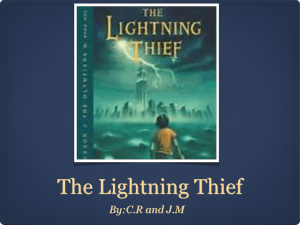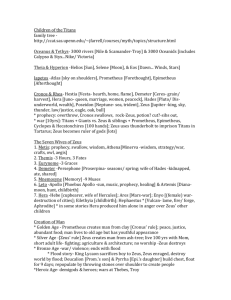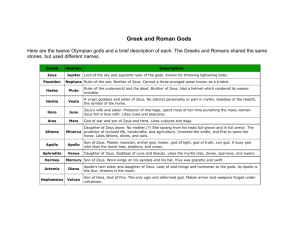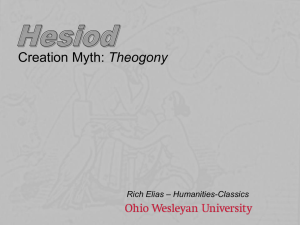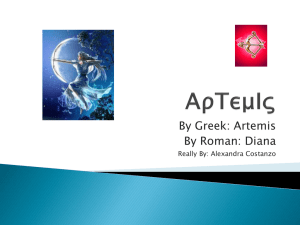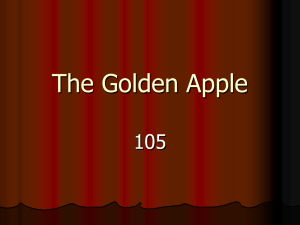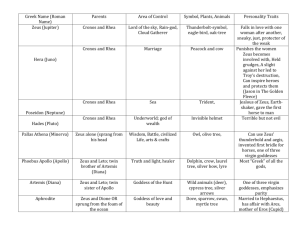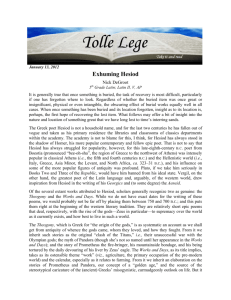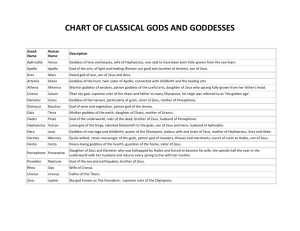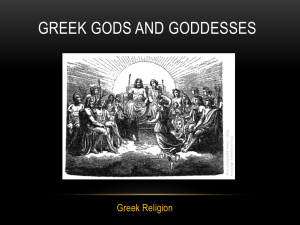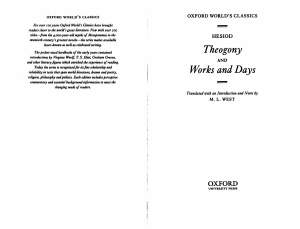Q83MYT lecture 2 handout
advertisement
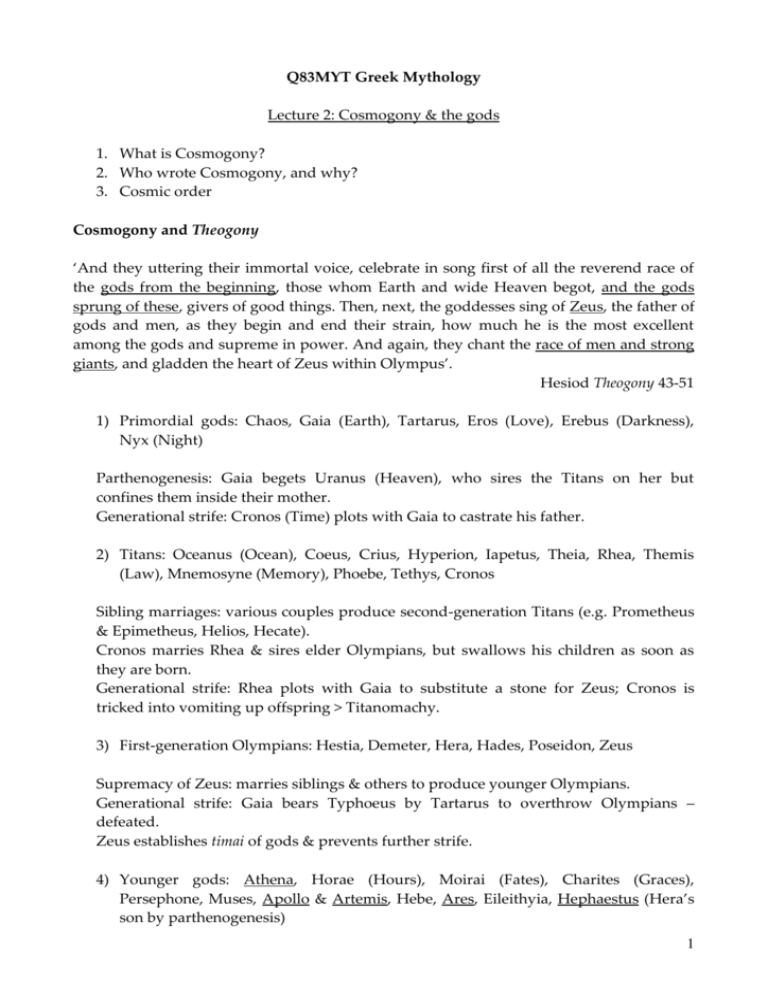
Q83MYT Greek Mythology Lecture 2: Cosmogony & the gods 1. What is Cosmogony? 2. Who wrote Cosmogony, and why? 3. Cosmic order Cosmogony and Theogony ‘And they uttering their immortal voice, celebrate in song first of all the reverend race of the gods from the beginning, those whom Earth and wide Heaven begot, and the gods sprung of these, givers of good things. Then, next, the goddesses sing of Zeus, the father of gods and men, as they begin and end their strain, how much he is the most excellent among the gods and supreme in power. And again, they chant the race of men and strong giants, and gladden the heart of Zeus within Olympus’. Hesiod Theogony 43-51 1) Primordial gods: Chaos, Gaia (Earth), Tartarus, Eros (Love), Erebus (Darkness), Nyx (Night) Parthenogenesis: Gaia begets Uranus (Heaven), who sires the Titans on her but confines them inside their mother. Generational strife: Cronos (Time) plots with Gaia to castrate his father. 2) Titans: Oceanus (Ocean), Coeus, Crius, Hyperion, Iapetus, Theia, Rhea, Themis (Law), Mnemosyne (Memory), Phoebe, Tethys, Cronos Sibling marriages: various couples produce second-generation Titans (e.g. Prometheus & Epimetheus, Helios, Hecate). Cronos marries Rhea & sires elder Olympians, but swallows his children as soon as they are born. Generational strife: Rhea plots with Gaia to substitute a stone for Zeus; Cronos is tricked into vomiting up offspring > Titanomachy. 3) First-generation Olympians: Hestia, Demeter, Hera, Hades, Poseidon, Zeus Supremacy of Zeus: marries siblings & others to produce younger Olympians. Generational strife: Gaia bears Typhoeus by Tartarus to overthrow Olympians – defeated. Zeus establishes timai of gods & prevents further strife. 4) Younger gods: Athena, Horae (Hours), Moirai (Fates), Charites (Graces), Persephone, Muses, Apollo & Artemis, Hebe, Ares, Eileithyia, Hephaestus (Hera’s son by parthenogenesis) 1 5) Mortals: Pandora given to Epimetheus in revenge for Prometheus’ tricking of Zeus; human race is born (compare Hesiod’s Works & Days for alternative accounts) 6) Heroes: gods & goddesses mated with mortal men & women to produce demigods. Alternatives to Hesiod ‘Homeric’ hymns: prologues to epic poetry Homer, Iliad: heroic epic Aristophanes, Birds: Comedy Plato, Timaeus: Philosophy Orphic Cosmogony: ‘mystery’ text Hyginus, Fabulae: mythological handbook Philostratus, Life of Apollonius of Tyana: biography How/why might different authors, time periods and genres produce different versions? The establishment of cosmic order a. The Olympian gods Zeus Hera Demeter Poseidon Zeus + Metis = Athena Zeus + Hera = Ares Zeus + Leto = Apollo & Artemis Zeus + Semele = Dionysus Zeus + Maia = Hermes Hera = Hephaestus (sometimes son of Zeus & Hera) Foam from Uranus’ genitals = Aphrodite (sometimes daughter of Zeus & Dione) Missing notables! Hestia, Hades, Persephone, Zeus’ other children by Hera...varies from text to text. b. Gods & men ‘First of all the deathless gods who dwell on Olympus made a golden race of mortal men who lives in the time of Cronos when he was reigning in heaven...but after the earth had covered this generation...then they who dwell on Olympus made a second generation which was of sliver and less noble by far...then Zeus the son of Cronos was angry and put them away, because they would not give honour to the blessed gods who live on 2 Olympus. But when the earth had covered this generation also...Zeus the father made a third generation of mortal men, a brazen race, sprung from ash-trees; and it was in no way equal to the silver age, but was terrible and strong...these were destroyed by their own hands and went down to the house of chill Hades, and left no name: terrible though they were, black death seized them, and they left the bright light of the sun. But when the earth had covered this generation also, Zeus the son of Cronos made yet another, a fourth, upon the fruitful earth, which was nobler and more righteous, a god-like race of heroes who are called demigods, the race before our own, throughout the boundless earth. Grim war and dread battle destroyed a part of them...but to the others father Zeus the son of Cronos gave a living and an abode apart from men, and made them dwell at the ends of the earth...and again far-seeing Zeus made yet another generation, the fifth, of men who are upon the bounteous earth...and Zeus will destroy this race of mortal men also when they come to have grey hair on their temples at birth’. Hesiod Works and Days 109-81 Bibliography Arthur, M. B. (1982) “Cultural Strategies in Hesiod’s Theogony: Law, Family, Society”, Arethusa 15:63-82. ___ (1983) “The Dream of a World without Women: Poetics and Circles of Order in the Theogony Proemium”, Arethusa 16:97-116. * Clay, J. S. (1989) The Politics of Olympus: Form and Meaning in the Major Homeric Hymns, Princeton. * ___ (2003) Hesiod’s Cosmos, Cambridge. * Gregory, A. (2008) Ancient Greek Cosmogony, London. Mondi, R. (1984) “The Ascension of Zeus and the Composition of Hesiod’s Theogony”, GRBS 25:325-44. * O’Brien, J. V. (1993) The Transformation of Hera: A Study of Ritual, Hero and the Goddess in the Iliad, Lanham. * Slatkin, L. (1991) The Power of Thetis: Allusion and Interpretation in the Iliad, Berkeley. Web resources: About.com: http://ancienthistory.about.com/library/weekly/aa010698.htm Greek mythology link: http://homepage.mac.com/cparada/GML/MythsCreation.html Theoi: http://www.theoi.com/ 3

